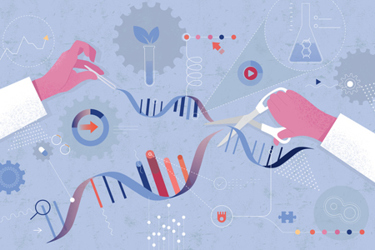Site Feasibility Tips For Cell And Gene Therapy Clinical Trials
By Jessica Cordes, senior consultant, Clinical Excellence GmbH

Advanced therapy medicinal products (ATMPs) are therapies for human use that are based on genes, tissues, or cells and offer groundbreaking new opportunities for the treatment of disease and injury. ATMPs can be classified into three main types:
- Gene therapy medicines: These contain genes that lead to a therapeutic, prophylactic, or diagnostic effect. They work by inserting recombinant genes into the body, usually to treat a disease, including genetic disorders, cancer, or long-term diseases.
- Somatic cell therapy medicines: These contain cells or tissues that have been manipulated to change their biological characteristics or cells or tissues not intended to be used for the same essential functions in the body. They can be used to cure, diagnose, or prevent diseases.
- Tissue-engineered medicines: These contain cells or tissues that have been modified so they can be used to repair, regenerate, or replace human tissue.
Across the world, ATMP definitions vary. In the U.S., the FDA defines ATMPs as “a biological product that is gene therapy, somatic cell therapy, or tissue-engineered product.” The EMA defines ATMPs as “medicines for human use that are based on genes, tissues, or cells.” And in Asia Pacific, the definition of ATMPs varies by country.
While the definitions of ATMPs may vary, the underlying principles remain the same, and they all offer new and innovative ways to treat diseases and injuries. However, they require specialized infrastructure, equipment, and staff to conduct their clinical trials, and the success of these clinical trials depends on the careful selection and qualification of investigators and sites to ensure the trial is conducted in compliance with regulatory requirements and that the rights, safety, and well-being of patients are protected.
Site feasibility assessment can be challenging. Failure to select and qualify investigators and sites can lead to delays in timelines, increased costs, and even the failure of the clinical trial. But the task is even more complex for ATMP, or cell and gene therapy, clinical trials. In addition to requiring specialized infrastructure, equipment, and staff, the investigational product(s) must be appropriately prepared, handled, stored, dispensed, and accounted for. Therefore, it’s essential to have a solid understanding of the regulatory obligations for investigators and sites when it comes to choosing each.
Understanding Regulatory Requirements For Investigators And Sites
According to the ICH E6, Good Clinical Practice1, the EC Guideline on Good Clinical Practice specific to Advanced Therapy Medicinal Products (C(2019) 7140 final)2, and the EMA’s Guideline on quality, non-clinical, and clinical requirements for investigational ATMPs in clinical trials3, investigators must fulfill the following requirements:
- The investigator should be qualified by education, training, and experience to assume responsibility for the proper conduct of the clinical trial.
- The investigator should provide adequate medical care to patients during the clinical trial.
- The investigator should ensure that the clinical trial is conducted in compliance with the protocol agreed to with the sponsor and that the trial is conducted in compliance with GCP and the applicable regulatory requirement(s).
- The investigator should protect the rights, safety, and well-being of patients.
- The investigator should ensure the investigational product(s) are used only following the approved protocol.
- The investigator should promptly report to the sponsor any adverse events that occur during the clinical trial.
- The investigator should maintain adequate and accurate source documents and clinical trial records that include all pertinent observations on each patient.
The guidelines also ask the following of sites:
- The site should have adequate facilities, equipment, and staff to conduct the clinical trial properly.
- The site should have access to an adequate number of patients.
- The site should have adequate procedures to ensure that all patients are informed of the clinical trial details and consent to participate in the clinical trial.
- The site should have adequate procedures to ensure that the clinical trial is conducted and data are generated, documented, and reported in compliance with the protocol, GCP, and the applicable regulatory requirement(s).
- The site should have adequate procedures to ensure that the investigational product(s) are appropriately prepared, handled, stored, dispensed, and accounted for throughout the clinical trial.
- The site should have adequate procedures to ensure that the clinical trial is monitored adequately.
- The site should maintain adequate and accurate source documents and clinical trial records that include all pertinent observations on each of the trial subjects.
Considering The JACIE Accreditation
The Joint Accreditation Committee ISCT-Europe & EBMT (JACIE) is Europe’s only official accreditation body in the field of hematopoietic stem cell transplantation (HSCT) and cellular therapy4. JACIE promotes high-quality patient care and medical and laboratory practice through a profession-led, voluntary accreditation scheme. JACIE accreditation can be helpful for the apheresis unit feasibility assessment as it provides a framework for assessing the quality of the infrastructure, equipment, and staff. JACIE accreditation also can help to ensure that the apheresis unit is conducting the clinical trial in compliance with the protocol, GCP, and the applicable regulatory requirement(s). It is not mandatory but is beneficial for sponsors and provides comprehensive documentation for the feasibility study. If an apheresis unit is accredited by JACI, the sponsor can use this assessment and shorten their own site feasibility assessment.
Sponsor Obligations
The sponsor should predefine a site profile and expectations on the investigator's knowledge and experience as well as the site facility and experience. The site profile should include general aspects as per ICH E6, Good Clinical Practice, and also cell and gene therapy-specific requirements. Furthermore, it should also consider the special requirements of the involved apheresis unit.
Having predefined site feasibility criteria, the feasibility study should collect information accordingly to compare the actual investigator and site experience with the selection criteria. Only those investigators and sites fulfilling all mandatory selection criteria should be approved for clinical trial involvement.
Adding ATMP-Specific Site Selection Criteria
In general, the site profile should include all regulatory requirements, thus, all criteria according to ICH E6, good clinical practice ICH E6(R2), for investigators and sites. For cell and gene therapy clinical trials, I recommend including the following additional criteria:
- Operational Experience Of Staff: The investigator and the site should not only be experienced in the disease but also in conducting complex clinical trials with many visits, various assessments per visit, complex procedures, and extended source documentation. For example, ATMP clinical trials can include more than 15 visits per patient. Visits with apheresis procedures typically take more than 6 hours each and increase the administrative burden for the sites in documenting this procedure, including donor information, procedure protocol, and all quality controls and information required to get entered into the patient health record and electronic case report form.
- Experience With Cell And Gene Therapies: The investigator and site should have experience with cell and gene therapies and have an understanding of the unique requirements of them, including product receipt, storage, preparation, handling, administration, accountability, and destruction. For example, the IMP might be cryogenic and shipped with a dry shipper on the day of planned treatment. The site must be prepared with all required IMP documents and must have enough time and space for documentation and IMP handling because this IMP type is delivered directly to the patient’s bed.
- Internal Collaboration Between Hospital Departments: Cell and gene therapy clinical trials are interdisciplinary, so the investigator and site should effectively collaborate with different departments to ensure all required clinical trial data are generated, documented, and reported in compliance with the protocol, GCP, and the applicable regulatory requirement(s).
- Specialized Infrastructure And Logistics With Cryogenic Products: The site should have experience with the logistical setup of cryogenic products, which are often used in cell and gene therapies. Here, the apheresis unit is critical for the starting material, and an excellent communication line by phone or email to the investigator and site should be in place. Typically, the sponsor is in daily contact with the investigator to ensure that all planned activities and the shipment are going smoothly.
- Extended Site Referral Network: The site should have an extended referral network to ensure that an adequate number of patients can be recruited. Here, the sites can work with referral sites that are not experienced in ATMP clinical trials or even clinical trials in general that are seeing the specific patients for the ATMP clinical trials.
- Willingness To Perform Patient Engagement Activities: The investigator should be willing to perform patient engagement activities to ensure that patients are informed of the clinical trial details and consent to participate. This aspect has an increased value for ATMP clinical trials because these are most often conducted in rare diseases with a very high screen failure rate (often more than 75%) due to the genetic stratification.
Site Feasibility Assessment: Two-Part Questionnaire And Visit
For cell and gene therapies, the site feasibility questionnaire is likely more detailed and longer than that of a traditional clinical trial. It will likely cover cryogenic storage and the involvement of many departments at the site as well as the supply of required emergency treatments.
To reduce the site’s burden and complete the feasibility documentation quickly, the questionnaire can be split into two parts: a general part and a shorter trial-specific part. The general part can be collected without a specific trial in question (and thus, without any time pressure), and the trial-specific site feasibility questionnaire can be collected once a trial is planned.
In all aspects, both site feasibility questionnaires together should align with your predetermined site selection criteria, and you should be able to check all requirements in the end. Please define only those site selection criteria that are crucial to approve a site for clinical trial involvement. Later, you will be able to collect all remaining information (like contact details for all involved site personnel) either during the site feasibility visit via your clinical research associate or another questionnaire after you have approved the site. After approval, your site will have a higher motivation to provide you with more details.
At the site feasibility visit, you can check all general aspects of the site (i.e., facility, storage, documentation, personnel, etc.), which are documented by your clinical research associate. Thereby, you can decrease the site’s documentation burden. You also have the chance to assess a potential split into a general site feasibility visit and a clinical trial-specific visit. This will shorten all future feasibility visits for a specific site and, thus, further decrease the site’s burden to invest time in providing redundant information, meeting the monitor, and showing the facility.
- International Council for Harmonisation of Technical Requirements for Pharmaceuticals for Human Use. ICH E6(R2) Guideline for Good Clinical Practice
- EC Guideline on Good Clinical Practice specific to Advanced Therapy Medicinal Products (C(2019) 7140 final)
- European Medicines Agency. Guideline on quality, non-clinical, and clinical requirements for investigational advanced therapy medicinal products in clinical trials https://www.ema.europa.eu/en/guideline-quality-non-clinical-and-clinical-requirements-investigational-advanced-therapy-medicinal-products-clinical trials-scientific-guideline
- Foundation for the Accreditation of Cellular Therapy. FACT accreditation. https://www.ebmt.org/jacie-accreditation
About The Author:

Jessica Cordes started her clinical operations career in 2009, working at various companies including Big Pharma and several small to midsize biotech companies. She gained extensive experience on different levels from country study management, global study management, and since 2018, leadership in clinical operations. During her time at Medigene and Immatics, she structured the clinical operations department, built cohesive global teams, and implemented GCP and ATMP compliant processes. For more than 12 years, she has been working in oncology clinical trials (including hemato-oncology as well as solid tumors) and with ATMPs since 2018. Since 2023, she has been working as an independent consultant and trainer, supporting small companies in building their clinical operations group and setting up their clinical trials for success. She also issues a clinical research bi-weekly newsletter and hosts a quarterly discussion.
